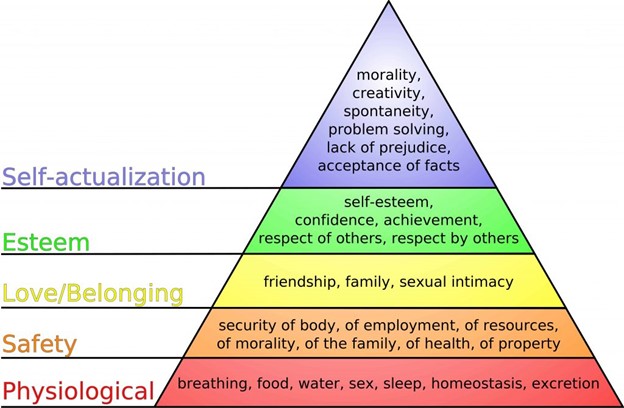Ahh summer-time. The (arguably) enjoyable weather brings about endless possibilities for outings, adventure, and quality time with friends and family. For many, the summer months indicate vacation and travel arrangements to sunny, tropical destinations. As appealing and worthwhile as a good getaway may be, these plans can also lead to uninterrupted thoughts about what to pack, what needs to get done, what to budget, feelings of guilt for leaving behind responsibilities, and an endless list of anticipated items. However, what many of us don’t think of packing is our well-being. Ensuring you are feeling your best self and are preparing in a way that will care for your mental health is just as essential as any other travel equipment.
Continue readingTag Archives: MS symptoms
Summer Heat and Changing Goals
By Stacie Prada
Each day, week, weekend, season, and year, I like to think about what my goals are. What will I want to accomplish? When it’s over, will I have a sense of fulfillment for the choices I made and how I spent time?
Each season or time of year has a different set of inherent challenges that aging and multiple sclerosis make more challenging. Spring and autumn consistently trigger fatigue and body malfunctioning for me. I blame the weather changes and obligation surges.
Continue readingOur Needs as Loved-One and Caregivers
By: Suzanne Marriott
I remember when my therapist reminded me that my husband was often in survival. She was referring to the most basic of human needs as defined by Abraham Maslow in his Hierarchy of Needs.
Continue readingMS and Mental Health
Whether you live with a chronic illness or not, there are many reasons why people struggle with mental health. Facing the complexities of life and other stressful factors, the line between feeling down and having depression can often become blurry. Even if you’re not clinically depressed, it is normal to feel low occasionally, but this doesn’t make it any easier. Especially when living with Multiple Sclerosis, this condition may complicate things even further.
Multiple Sclerosis affects everyone differently. Although symptoms vary from person to person, it’s common to experience difficulty walking, weakness, numbness, and tingling. Without a doubt, these physical symptoms are challenging. However, emotional challenges and mental health struggles can be just as, if not more, debilitating.
Fortunately, mental health awareness has come a long way in recent decades which has resulted in more research about the role mental health plays in our well-being and how to address it. Maintaining your mental health while living with MS can be managed through coping strategies. Here are a few ways to improve your mental health and emotional well-being:
- Don’t overexert yourself. Be kind to yourself and have grace. Listen to your body and do what your body can handle.
- Consider therapy. Engaging in therapy can be an effective way to recognize your emotions and feelings and evaluate them to better help you.
- Focus on life outside of MS. It’s essential to remember that MS does not define you. You are so much more than your diagnosis! Focus on your goals, projects, and fun plans. Take a step back from the demands of MS and nurture your mental health.
- Prioritize movement and exercise. Exercise has abundant benefits for the mind, body, and soul. A few activities can include chair yoga, walking, bicycling, or swimming. Find a hobby that you enjoy and that you can physically and emotionally partake in.
- Locate a local support group for MS patients.
Multiple Sclerosis is a challenging diagnosis that can pose mental health impacts on individuals. It’s essential to recognize when you’re feeling down or just not yourself. Make self-care a vital part of your daily routine. There may be times when self-care techniques are not enough. In this case, it’s essential to seek professional help and speak with your doctor. Do not be afraid to ask for help if you are having a difficult time. It is not a sign of weakness, but rather a sign of strength to know when you need help.
Growing Pains
By: Diana Cruz
Being diagnosed with a medical condition, especially at a young age, can take on an unfathomable toll. Physical, mental, and emotional aspects of yourself that haven’t even fully developed are now forcibly taking on the additional role of simultaneously fighting, healing, and growing. As someone who was diagnosed with an autoimmune disorder as a child, and displayed symptoms even earlier on in life, it was difficult for me to understand what was going on with my body. The non-stop infections, the continuous weakness that increased with weekly blood tests and frequent operations, and the never-ending dizziness at an age where I was supposed to be the most energetic left me feeling inexplicably different than the kids around me.
Continue readingIntentional Motivation
By Stacie Prada
It’s hard to stay motivated to do everything I think I should do to be healthy and live well with Multiple Sclerosis. It seems like the hope of living with fewer MS symptoms and potentially less disease progression should be enough motivation, but temptation, fatigue, and a bit of resentment that I even have to deal with MS demotivate me.
Demotivation can also come from unlikely sources. A few years ago, I saw a physical therapist for hip pain. I described the fitness routines that I’d done for years. It included a daily minimum stretching and activity quota, and I was proud of myself for always doing it. I was very flexible and fairly strong. My habits supported my fitness level.
Accurately, the physical therapist told me I had plateaued with my exercises. I needed more strength training to address the hip pain and improve my fitness level. I did the prescribed exercises until the pain subsided, but it was tough doing everything they suggested. I was discouraged that I wasn’t doing it all. Not only did I stop doing the prescribed exercises, but I also stopped doing my minimum daily fitness regimen.
I took good information, and I mentally warped it into nonsense. Because my previous minimum daily routines weren’t enough, I concluded they weren’t worth doing. I justified that I was still active and exercising, I just wasn’t doing it daily.
Put in writing, it’s obviously flawed and unhelpful logic. In my mind, it made sense. In reality, I squandered good habits that were helping me. After a few years without daily stretching, my flexibility and strength diminished. Things that used to be easy are painful. I recently reintroduced my daily minimum regimen as mandatory, and I’m seeing improvement. My flexibility and strength are increasing, and my movements are less painful.
Reflecting on this experience inspires me to be more intentional about what motivates me and what discourages me.
The motivation that comes from excitement works better than fear. I have more success working toward goals than trying to avoid potential consequences. I want to feel like I’m being rewarded, not punished.
My resentful and fearful thought process is that I have to exercise so that I maintain my mobility as best as possible because I have a sucky disease that mostly targets my spine and affects my legs and arms. If I don’t keep moving, I won’t be able to keep moving.
My enthusiastic thought process is that I get to exercise and live in a body that can do things I enjoy. The better I treat my body, the better I’ll feel, the more I’ll be able to do, and the better odds I’ll have aging with MS. If I keep moving, I’m more likely to be able to keep moving.
Both approaches are true, and both work. When my resentful mindset kicks in, I hope to notice it and not give up. I want to remember how much my body has done for me and continues to do for me and set a goal that excites me. It doesn’t have to be a big goal, it just needs to be meaningful and encouraging. When motivation comes from an enthusiastic mindset,
I’m eager to do what’s good for me, and I’m happier overall. It’s a win-win!
*Stacie Prada was diagnosed with RRMS in 2008 just shy of 38 years old. Her blog, “Keep Doing What You’re Doing” is a compilation of inspiration, exploration, and practical tips for living with Multiple Sclerosis while living a full, productive, and healthy life with a positive perspective. It includes musings on things that help her adapt, cope and rejoice in this adventure on earth. Please visit her at http://stacieprada.blogspot.com/
Spring Awakening
As the winter months dwindle into our rearview, spring season awakens and brings the opportunity to refresh our mind, body and soul. Spring season brings longer days, warmer weather and a plethora of natural beauty which allows us to reconnect with ourselves and the world around us.
After a long and dreary winter, stepping outside on that first warm day of Spring can welcome a sense of liberation. Feeling the warmth of the sun on our skin has a calming effect and the gentle breeze is simply refreshing.
Spring awakens the beauty of nature – birds singing, flowers blooming and lush greenery. This season more than ever is the ideal time to connect with nature. Going for a leisurely walk or sitting outside and listening to the sounds of nature is good for the soul. You can enhance this experience by practicing meditation or mindful breathing. Close your eyes, quiet your mind, and take a deep breath in…. It may sound simple, but mindful breathing is a great tool to be present in the moment and feel more grounded and centered in nature.
Unplug to recharge. Without a doubt, one of the best parts of spending time outdoors is disconnecting from our screens. In the world we live in today, it’s easy to get consumed by our screens, whether it’s our phone, laptops or television. The Spring season is the perfect opportunity to take a break from technology and immerse ourselves in nature. Disconnecting from screen time can allow us to focus on the present moment and listen to our mind, thoughts, and feelings.
Spring is a season of renewal. It brings forth the opportunity to refresh our mind, body and soul and connect with nature. Take advantage of the longer days and pleasant weather. It can be as simple as opening a nearby window and listening to the sounds of nature or grabbing a chair and sitting outside. Enjoy the simplicity and beauty of nature, and who knows, you may even discover new passions and interests along the way.
A Fruitful Spring
Spring is here and what better season to enjoy and have some fun. Everything around is fresh and new. How much ever bleak your winter may have been, this season brings a promise of renewed beginnings. Here are some ideas of things to kick off your spring and make the most of this time.
Get back on your exercise regimen. Walking outdoors can improve your heart health and elevate your mood. Being active for some time during the day can strengthen your body and immune system. Ask your friend to join you and make this an enjoyable time that you look forward to in your daily routine.
For those who may have issues walking, grab a chair and enjoy the outdoors. If you own a binoculars, you can keep an eye for bird movement on trees and even catch the squirrels and bunnies chasing each other. You can also set up a bird feeder in your backyard and let the birds fly right in front of you. You can read a book in your backyard or patio while absorbing the sunlight and feeling the gentle breeze.
Plant some seeds. Caring for plants can be a rewarding experience. They help to improve the quality of air around your home. Besides that, it is a joy to see the seeds sprout and enjoy the fruits of your labor. The scent of the lilies, tulips, daffodils, and gladiolas in assorted colors can soothe your senses and refresh your mind.
Declutter your space. To stay on track, make a checklist of tasks that you would like to tackle in the coming days. We tend to accumulate things over the years. Things we don’t often need and things that we can live without. Its time to sort it all. Involve the whole family and let everyone pitch in to do their part. Not only will you be proud of yourself at the end of this accomplishment, but it is also a great opportunity to donate clothes and other household items to those who need it.
It is a wonderful time of the year that is eagerly awaited upon. A greet time to make memories and enjoy new experiences. So get out there and let the magic begin.
Little Miss MS Mama
It was the longest three minutes of my entire life. Tik, tok, tik, tok. I looked at the timer on my phone like I couldn’t peel my eyes off it. My nerves were an all-time high, as I took a deep breath and looked over at the nightstand where the pregnancy test lies. I saw the words “pregnant” on the stick. I have never felt so much joy and excitement while being downright terrified at the same time. I immediately called my husband and told him the news. In all fairness, he told me to wait until he was home from a business trip in California, but I had to take the test that day. We were both ecstatic.
Continue readingFamily Planning and MS
Family planning is an important aspect for people with MS, as hormonal changes during pregnancy and postpartum can impact the course of the disease. It is crucial for individuals with MS to discuss their family planning options with their neurologist and obstetrics and gynecology (OB/GYN) to make informed decisions about their reproductive health.
Continue reading



